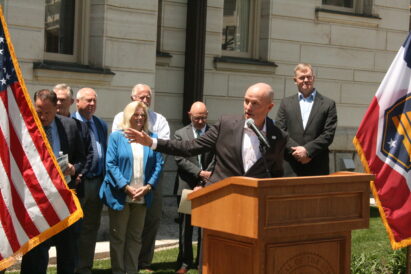Catholic Community Services opens food pantry to furloughed IRS workers
OGDEN — Skyler Coles hasn’t typically sought handouts to make ends meet.
He works two jobs — normally, at least — and even sells his plasma to generate a little extra income. But on Thursday, the furloughed Internal Revenue Service employee found himself in an unfamiliar setting — at the Catholic Community Services food pantry, taking the group up on its offer of groceries to federal employees impacted by the three-week old government shutdown.
“I’ve never had to do anything like this,” he said, pushing a cart of food.
CCS, which typically gears its pantry to the poor and working poor, has opened the facility to furloughed federal employees, aiming to help them through the crunch. The shutdown started Dec. 22 and an estimated 800,000 federal employees across the country are going without pay pending a resolution to the conflict, including some 5,000 Ogden-area workers at the IRS, a key local employer.
“We’ve got a lot of IRS employees in the area and a lot of them are living paycheck to paycheck,” said Maresha Bosgeiter, director of the CCS office in west Ogden. CCS has opened its doors to furloughed federal employees in past shutdowns, she said, and the aim is to offset at least a portion of impacted workers’ expenses so their limited resources go further.
On Thursday morning, numerous furloughed workers crowded into the grocery store-like pantry to gather food, and Bosgeiter said CCS has seen a steady stream of them since the initiative launched last week. Around 60 furloughed workers visited the food pantry last Tuesday, she said, and 50 or so came on Wednesday.
The shutdown is “stressful and scary,” Bosgeiter said, and CCS plans to continue the effort until the shutdown ends. The agency will seek additional donations if needed to replenish its food offerings and, given the local circumstances, has already received an extra truckload of food from the Utah Food Bank.
Coles, who’s from West Haven, said he’s already asked for extensions on payment on some of his bills, including his son’s karate lessons, and his family is closely watching its spending, staying home more. “We don’t do much of anything,” he said. He still has his job at a supermarket, but it’s only a part-time position and doesn’t generate enough to cover the bills.
Ernesto Chavez, of Ogden, another furloughed IRS worker at the pantry, said he’s managing for now, thanks to savings. If the shutdown continues much longer, though, the money will run out. “Then it starts getting tight,” he said.
Jessica Robison, also furloughed from her IRS job, worries about missing her next home mortgage payment. That would result in a fine and, maybe more significantly, a ding to her credit rating, the Roy woman said.
She’s in the process of prioritizing her bills and has considered a payday loan, which would come with a steep interest rate of 10 percent a week. “We’re basically sorting out what we’re going to pay and what we’re not going to pay at this point,” she said.
Either way, though, she figures she’ll take a hit. Presuming the shutdown eventually ends and she gets back pay for the time she was furloughed, it still won’t make up for the fines or interest she fears she’ll face by either missing a mortgage payment or taking out a payday loan.
“I try not to get upset by it,” she said.
The IRS is one of several agencies impacted by the partial federal government shutdown. The key sticking point to funding legislation to get the impacted agencies running again is President Donald Trump’s call for the inclusion of as much as $5.7 billion to expand the wall along the U.S.-Mexico border, opposed by Congressional Democrats.










